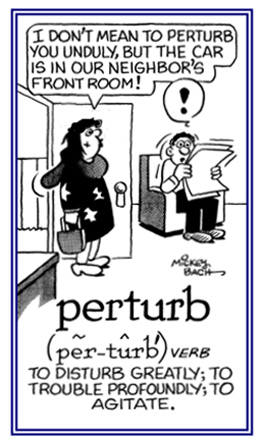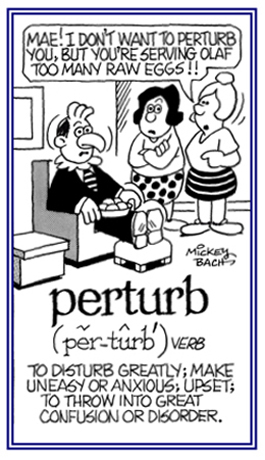turb-, turbin-, turbo-, turbu-
(Latin: uproar, commotion, disorderly, agitated, confusion; whirl, whirlwind)
Jack seemed totally imperturbed when he heard the news of the disaster, and no one knew why.
2. To cause someone to be worried or upset: Andy's mother and father were perturbed that he was thinking about not going to school anymore.
3. To make uneasy or anxious: Helena's teacher was perturbed by the lack of interest of his students in his chemistry class.
4. Etymology: from Latin perturbare, "to confuse, to disturb"; from a combination of per-, "through" + turbare, "to disturb, to confuse, to throw into disorder."


Go to this Word A Day Revisited Index
so you can see more of Mickey Bach's cartoons.
2. Able to be confused or unsettled: The sudden accident caused a perturbable result of disorder and bewilderment among those at the concert.
2. A cause of mental disquiet, disturbance, or agitation: Tim's bizarre haircut was the perturbation that upset his parents at Easter dinner.
3. Variation in a designated orbit, as of a planet, that results from the influence of one or more external bodies: Gravitational attraction between planets can cause perturbations and cause a planet to deviate from its expected orbit.
Perturbations in Neptune's orbit led to the discovery of the object that was causing the perturbation, the planet Pluto.
Perturbations in the orbits of stars have led to the discovery of planetary systems outside of our Solar system.
The Quasiturbine is at the crossroad of three modern engines. Inspired by the turbine, it perfects the piston, and improves upon the Wankel.
The Quasiturbine is universal in relation to energy sources: Liquid and gaseous fuel, hydrogen, steam, pneumatic, and hydraulic. The Quasiturbine engine was invented by the Saint-Hilaire family and first patented in 1996. The engine makes use of a complex computer calculated oval shape stator housing, creating regions of increasing and decreasing volumes as the rotor turns. It is capable of burning fuel using detonation, the optimal combustion mode of the future which the piston cannot stand.
- Wave power involves the use of the up and down motions of the waves to produce electricity.
- Tidal power consists of harnessing the action of the tides with underwater turbines, which twirl like wind machines.
- A third type of power generation, called ocean thermal, has the objective of exploiting temperature differences between the surface and the deep ocean, and is primarily applicable to tropical areas.
- Some experts claim that ocean electrical power has more advantages than wind power because water is about 850 times denser than air, and so it consists of far more energy.
- The ocean's waves, tides, and currents are also considered to be more predictable than the wind.
- The negative aspect is that seawater can batter and corrode machinery, and costly undersea cables may be needed to bring the electrical power to shore and the machines are considerably more expensive to build.
- General Electric, which builds wind turbines, solar panels, and other equipment for virtually every other type of energy, has so far stayed clear of ocean energy because of the much greater costs.
2. A skyrocket that has a spiral flight: At the yearly firework display, Jack and Jill watched the tourbillon emitting bright lights up high in the air.
3. An ornamental firework which turns around, when in the air, so as to form a scroll of fire: The crowd watched the tourbillon that gyrated in the air.
4. Etymology: "whirlwind; firework" with a spiral flight; from French tourbillon, "whirlwind"; from Old French torbeillon, ultimately from Latin turbo-, "whirl, whirlwind"; genitive of turbinis, "whirlwind".
5. In horology, a frame for the escapement (a device which converts continuous rotational motion into an oscillating or back and forth motion) of a timepiece, especially in an epicycle and assumes all the vertical positions in one or two minutes; therefore, minimizing or neutralizing position errors.
The tourbillon is one of the most valued features of collectors' watches and premium timepieces, possibly for the same reason that mechanical watches obtain a much higher price than similar quartz watches that are much more accurate.
High-quality tourbillon wristwatches, which are usually made by the Swiss luxury watch industry, are very expensive, and typically retail for prices in the tens of thousands of dollars or euros being common, for example, a "Reverso Gyrotourbillon 2" (a spherical tourbillon) watch by Jaeger-LeCoutre sells for about $400,000, or more.
Single and multi-axis tourbillons aim to counter the distorting effect of gravity on a watch by rotating its escapement mechanism on one plane in a single tourbillon or three-dimensionally in a multi-axis complication.
The function of the tourbillon is to make the watch run more consistently, but it does not improve the inherent time-keeping accuracy of the watch.
In fact, as energy is required to rotate the tourbillon cage, most tourbillon mechanisms incorporate small balance wheels to compensate for the energy loss, which is actually detrimental to the precision of the watch.
Etymology: from Anglo-French turbeillun; which came from Latin turbin-, turbo-, "whirl, whirlwind".
2. A distressing or difficult circumstance or situation: Mary has had many troubles ever since she took the job.
3. A cause or source of distress, disturbance, or difficulty: The new students were a trouble to Mrs. Tall, the teacher.
4. A condition of pain, disease, or malfunction: Mary's father had both heart trouble and car trouble.
5. Public unrest or disorder; a disturbance: The newspapers were full of articles about the troubles in Northern Ireland.
6. Something that is extremely difficult or which presents a problem: The trouble with the leaking roof was found b the worker.
Origin of the word, trouble
When a person is in trouble, his or her mind is ill at ease. The Latin parent of the word trouble indicates the same thing because "turbo" meant "disturb".
It came into Englsh first with the spelling "turble", then "truble", and finally trouble. This same Latin word, "turbo", has given us "turbulent", full of commotion; "disturb", throw into complete disorder, and "turbid", or in other words, a "turbid" stream which is all muddied up.


